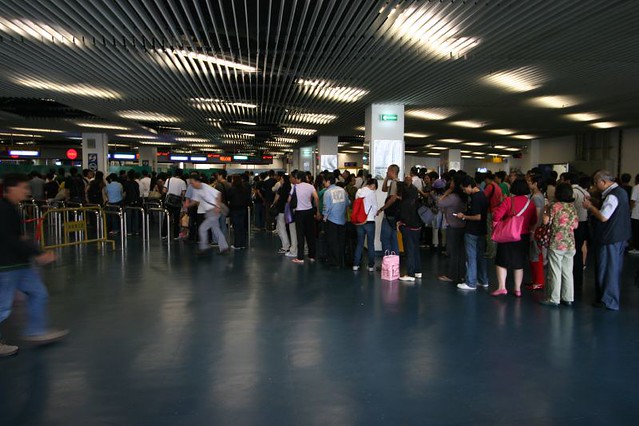English translation here
Aujourd’hui, j’entends toujours de la crise migratoire; tous les grands nations puissant de l’ouest, comme l’Etats Unis et la France, sont confrontés avec une abondance des immigrants. Avec des personnalités publiques comme Donald Trump est Marine Le Pen, on entends toujours de le danger et chaos que les immigrants vont apporter avec eux quand ils traversent la frontière. Mais, la chance d’être tuer par une attaque de terroriste au Etats Unis est d’un cas sur un million est on vient d’apprendre du procès d’El Chapo que les substances illicites traversaient la frontière des entrées régulières, pas dans les ouvertures des barrières. Alors cela vous fait penser; a quoi ca serre une mur ou une interdiction de voyager si cela n’empêche pas ces menaces extérieures? La vérité de ces murs physical et idéal est qu’il sont simplement un autre chose qui empêche les migrants pour entrer. Les sont une déclarations au monde que la nations n’est pas acceptant a des différentes personne avec des différentes cultures. Ces politiciens conservative utilisent leur position pour vocaliser leur opinion contre l’interculturalisme sans avoir d’expérience personnel. En essayant de protéger les enfants de leur nation, ils les blessent car l’exposition à des différentes cultures est très benificiel.
Moi, je viens d’une famille d’immigrants; mes parents son on émigre de l’Ethiopie. J’habite dans une communauté ou je suis exposé à plusieurs diffèrent culture, plus que la culture éthiopienne et classique américaine et mon école est un école international. De mon expérience, je vois que cet exposure au culture est avantageux.
Je crois fermement que ma éducation multiculturelle m’a fondamentalement bénéficié. J’ai remarqué que chaque culture me permet d’avoir une perspective unique sur la politique, l’histoire, et beaucoup plus. Non seulement qu’il incite une perspective exclusive, mais aussi m’aide à communiquer avec les autres.

Dans l’essai d’Amin Maalouf “Les identités meurtrières”, l’auteur remarque qu’avoir deux ethnies (et par conséquent deux cultures) est surtout avantageux. Maalouf est libanais chrétien et parle l’arabe, la langue de l’Islam. Il explique que, alors que les deux ont des cultures oppositionnel, il apprécie ce que le multiculturalisme ajoute à sa vie. Dans Les identités meurtrières, l’auteur utilise une allégorie dans lequel il décrit sa rencontre avec un vieil homme arabe. Malgré le fait que l’homme est d’une génération diffèrent et un étranger, l’auteur a pu communiquer avec lui d’une manière polie et appropriée en arabe. C’est quelque chose que j’ai profité de toute ma vie. La capacité de comprendre plus d’une langue est un avantage que evident. Cependant, la connexion que Maalouf a pu partager avec le vieil homme était plus que n’est pas basée sur seulement la langue.
Quand d’autres éthiopien me reconnaît comme éthiopienne, il y a une connexion immédiate, et la compréhension qui vient de plus que la langue. C’est la connaissance que quelqu’un d’autre partage quelque chose avec vous qui est assez significant à votre identité. Cela montre que les avantages d’une double culture vont au-delà du langage oral. Dans un monde où les mots ne suffisent pas à unire les gens, je crois que ce type de connection est important.
En dehors, de mon ethnicité éthiopienne. Je trouve que l’exposé que j’ai à différents cultures est avantageux aussi. Par exemple, à cause des differents communauté d’immigrants, je peut apprécier leur nourriture, arts, est la langue. Par conséquent, il y a des situations ou on peut créer quelque chose nouveau par mélanger les cultures. Une exemple est la nourriture chinois-américaine ou mexicain-américaine.
L’empathie, de la perspective, les nouvelles expériences et la communication, sont tous des avantages qui emportent sur le inconvénients d’être multiculturel. Cependant, il est important de considérer quel type de communauté ou j’habite et comment elle affecte mes opinions. Mon école est une école où le multiculturalisme est extrêmement encouragé. Je vis dans une région où il y a aussi une grande communauté éthiopienne et cependant a beaucoup de support. Cela crée un biais. Il est facile pour moi de réclamer mon double ethnicité comme un avantage parce que je vis dans une communauté plus acceptant que les autres. Il y a beaucoup d’autre au diffèrent parties du monde qui sont marginalisés à cause de leur ethnicité. Une personne sans ce type de soutien est probablement plus exposée à la xénophobie et aurait donc une opinion diffèrent sur le multiculturalisme.
Mais, cela n’en demeure pas moins que si ont ferment not frontière nationaux, on risque de faire préjudice au peuple. Et sans promoter la multiculturalisme, on perdra ce qui définit Les Etats Unis; une nation d’immigrant. On risque de créer une nations qui support d’ignorance et de la xénophobie. En conclusion, il faut qu’on ouvre nos frontière et accepte le support la multiculturalisme.
Par Ye’Amlak Zegeye
English Translation
Building Border Walls Will Put the Next Generations at a Disadvantage: A critique of Anti-multiculturalism
These days, the immigration crisis seems to be everywhere. I constantly hear about how all the great powerful western nations, like the United States and France, are “confronted with swarms of immigrants”. We’re told of the danger and chaos that immigrants bring when the border illegally from politicians such as Donald Trump and Marine Le Pen. However, the chances of getting attacked by a terrorist in the US is one in a million. In addition, we recently learned from El Chapo’s trial that most of his drugs were transported through legal ports of entry. These recent events beg the question: what is the purpose of a wall or a travel banel if it does not prevent outside threats? The truth about the wall in theory, is that it is simply another factor keeping immigrants from entering the country. The walls and travel bans adopted by a nation send a global message that they do not accept different people with different cultures. Conservative politicians, without personally experiencing interculturalism, use their position to voice their opinion against it. In trying to protect the children of the nation, these politicians actually hurt them as they deprive them of the benefits of exposure to different cultures.
I come from a family of immigrants; my parents immigrated from Ethiopia. I live in a community where I am exposed to many different cultures more than the ethiopian culture, or the classic american culture or my international school. In my experience, I see that this cultural exposure is an advantage.
I firmly believe that my multicultural education fundamentally benefitted me. I’ve noticed that each culture allows me to have a unique perspective on politics, history and much more. Even more than giving me unique perspectives, my multicultural education helps me communicate with others.
In Amin Maalouf Essay, “Les identités meurtrières”, the author states that having two ethnicities (and thus two cultures) is definitely advantageous. Maalouf is Libyan Christian and speaks Arabic, the language of Islam. He explains how, despite the conflicts between these two cultures, he appreciates what multiculturalism has in his life. In “Les identités meurtrières” the author uses un allegory to describe the time he met a old arab man. Despite the fact that the man was a generation older than him and a stranger, the author was able to talk to him in a politely and appropriately in Arabic. This type of scenario is something I’ve benefits from all my life. The ability to understand more than one language is evidently an advantage.
When other Ethiopians learn that I’m ethiopian, we have an immediate connection that goes beyond the language itself. Knowing that someone else shares these values with you is important to your identity. The advantages of being bilingual go beyond just the language aspect. In a world where words aren’t enough to unite people. I believe that this type of connection is important.
Apart from my Ethiopian ethnicity, I find that my exposure to different cultures is also advantageous. For example, because I’m exposed to other different immigrant communities, I can appreciate their food, art and language. These mixing of cultures can create something new, like Chinese-American or Mexican-American food.
Empathy, perspective, different experiences and communication are all advantages of being multicultural. Therefore, it is important to acknowledge the type of community where I live and how that affects my opinions. Multiculturalism is also extremely encouraged at my school. I live in an area where there is also a large ethiopian community and have lots of support. But this also creates a bias. It is easy for me to see my double ethnicity as an advantage because I live in a community that is more accepting than others. There are a lot of other places in the world where people are marginalized because of their ethnicity. Those people are probably more exposed to xenophobia therefore causing their opinion on multiculturalism to be different.
These feelings with not go away if we close our nation’s borders we risk treating people with prejudice. Without promoting multiculturalism, we lose what defines the United States, which is a nation of immigrants. We risk creating nations that support ignorance and xenophobia. In conclusion, we should open our borders and support multiculturalism.
By Ye’Amlak Zegeye, translation by Celeste Bloom


































































